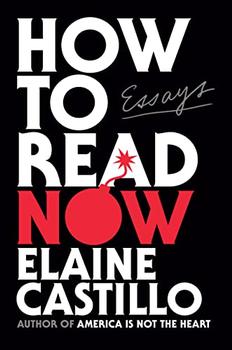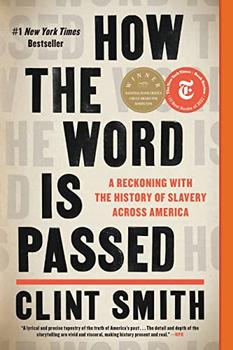Summary | Excerpt | Reviews | Beyond the book | Read-Alikes | Genres & Themes | Author Bio

Essays
by Elaine CastilloToni Morrison once wrote, "My project rises from delight, not disappointment." This remark appeared in — and referred to — her 1992 volume of essays Playing in the Dark, a scintillating text exploring how the fundamentally racialized nature of American society has influenced its literature. In How to Read Now, which treads similar ground in looking at how historical constructs of power influence ways of reading and how this in turn affects…well, everything, author Elaine Castillo's subject matter is sometimes somber but her rendering of it is a delight.
Her multifaceted and playful approach is captured in the title, which can itself be read two ways: how to read literature in our contemporary moment, and how to read that moment itself — how to read the world that we're living in. The book delivers on both of these interpretations and demonstrates how they inform one another, encouraging us to read books — and "read" everything around us: TV, film, the news, people — in a manner that reflects the complexity of our own whole selves and how we stand in relation to one another.
Castillo's lively and expressive writing underscores the idea that reading through the default white supremacist mindset that reaches us invisibly and blandly via American media and the publishing industry is not just lazy, reductive and violent, it's also boring. She plunges into How to Read Now with a sense of excitement, buoyant stylistic flourishes — including one-of-a-kind, unforgettable phrases like "gooey heart-porn of the ethnographic" — and a seemingly irrepressible fondness for astrology (referring to herself at one point as "a bossy Virgo bitch"); this doesn't come across as a gimmick or an attempt to inject humor into dry material, but rather a natural enthusiasm born of the stimulating work of seeing that which is not meant to be seen. Her writing is alive with the kind of momentum and confidence that can only result from having ideas of substance — and what could be more substantial, more intellectually exciting, really, than challenging our societal lens, one meant to define the limits of how we encounter the world?
While How to Read Now exudes energy full of possibility, it is frank in its assessment of how American public policy exploits and neglects racially marginalized people, noting how the last two years have "laid bare the outrageous truths many of us have always known" and how these truths cannot be separated from the sad state of our current reading culture. Castillo is in the above quote referring to the Trump administration's (lack of) management of the COVID-19 pandemic. However, the political shifts that have taken place since Trump has been out of office, and even since I first laid eyes on a review copy of How to Read Now a couple of months ago, continue to throw into harsher light the United States' never-eradicated white supremacist origins, along with the inextricably linked misogyny and anti-LGBTQ+ sentiment that is actively in the process of destroying basic human rights that affect everyone. In the associated ongoing attempts at censorship in libraries and schools, we also see a clear refutation of the characteristically American idea that reading is a silly, powerless pastime that doesn't actually matter.
Clearly, reading does matter, but it should also be apparent by now that the specific ways in which American liberal reading culture has continued to present education and books as an antidote to oppression are not helping. How to Read Now is an accessible first step for those who want to understand, through a generously human point of view, why, and — along with its many other attributes — a bit of friendly affirmation for those who have understood that approaches like "reading for empathy" as a cure for racism were never going to work, in part because they were simply a rebranding of the ways in which writers of color have long been expected to serve a white audience, a new manifestation of this power imbalance rather than a solution. Castillo dismantles the popular misperception that lack of education and ignorance drive bigotry; if anything, she notes, Americans are very educated in white supremacy, patriarchy and heteronormativity: "It's not a question of bringing people out of their ignorance—if only someone had told me that Filipinos were human, I wouldn't have massacred all of them!—but a question of bringing people out of their deliberately extensive education."
In showing us what this might look like, Castillo travels far and wide. She juxtaposes the colonialist gaze in the work of Joan Didion with the Indigenous perspective in Tommy Pico's poetry, considers abolitionist-themed teapots in Jane Austen's Britain, studies the political implications of Peter Handke's Across (the original title of which translates, crucially, to something more along the lines of The Chinaman of Suffering), dives into an exploration of the Wong Kar-wai film Happy Together while reflecting on her ability to relate intensely to the character Lai Yiu-fai, points out the successes and failures in the racial consciousness of HBO's Watchmen, and describes growing up in a diverse Filipinx community while being drawn to writers "across borders," from Plato, Kant and Thomas Mann to Banana Yoshimoto and Manuel Puig. She reflects in depth on what it means to be an "unexpected reader" of a text, someone who was intended to be its subject rather than its audience, "walking in on a conversation [they weren't] meant to witness." The collection closes with a particularly poignant and compassionate essay analyzing a scene from Homer's Odyssey.
That Castillo's work is beautiful, irreverent and fun matters because it offers a real, fulfilling alternative to the melancholic confusion and helplessness that pervade much of contemporary American book culture. The simultaneously exuberant and incisive nature of her reflections shows how enriching and joyful greater awareness of structural, historical and sociopolitical factors in the reading experience can be.
To stress its significance, I want to say Castillo's book is essential for book clubs as well as reviewers and critics and scholars, that if the world we live in now is one that we can transform into the much better one necessary to survive our current challenges, it will be required reading for college literature courses decades from now. And I believe all of that. But really, it's a book for anyone and everyone who wants it, including those who may not regularly consume literature but still wish to "read." It's for an unexpected someone who will come across it in the future, a person we can't yet imagine but whose presence we should make room for nevertheless.
![]() This review
first ran in the August 3, 2022
issue of BookBrowse Recommends.
This review
first ran in the August 3, 2022
issue of BookBrowse Recommends.

If you liked How to Read Now, try these:

by Carvell Wallace
Published 2024
A transformative memoir that reimagines the conventions of love and posits a radical vision for healing.

by Clint Smith
Published 2022
The Atlantic staff writer and poet Clint Smith's revealing, contemporary portrait of America as a slave owning nation.




Censorship, like charity, should begin at home: but unlike charity, it should end there.
Click Here to find out who said this, as well as discovering other famous literary quotes!
Your guide toexceptional books
BookBrowse seeks out and recommends the best in contemporary fiction and nonfiction—books that not only engage and entertain but also deepen our understanding of ourselves and the world around us.